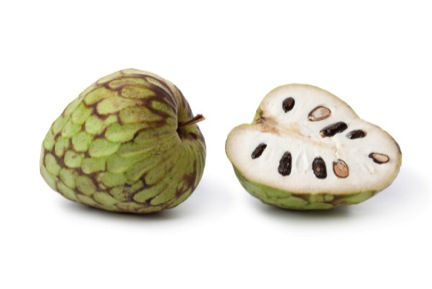7 Really Good Reasons To Eat Cherimoyas
8 years ago | Nutrition
By Joy Stephenson-Laws JD, Founder
You probably know by now I have a green thumb and a love for exotic fruits. I recently shared with you I added loquats and kumquats to my garden, and now there is another fruit in season on my radar. This fruit is the cherimoya, and Mark Twain called it “the most delicious fruit known to man.”
Unfortunately, like the loquat, cherimoyas are not often commercially grown. The good news is you can plant the tree yourself, and you may luck out finding cherimoyas at your local farmer’s market now that they are in season.
What is a cherimoya?
A cherimoya, also known as “the custard apple” due to the creamy texture of the flesh of the fruit, is a tropical fruit that was first planted in California in 1871. Cherimoyas are native to southern Ecuador and northern Peru. The fruit resembles a cross between an artichoke and strawberry, but is said to taste like banana, papaya and pineapple. Do not eat the seeds or skin, they are both toxic.
Why should you eat them?
On top of having no saturated fat and cholesterol, one cherimoya (without the skin or seeds) contains several nutrients including:
- 0.63 mg of iron. The recommended daily allowance (RDA) of iron depends on age, sex and if you are pregnant, but a male between 19-50 needs 8 mg. Just one cherimoya will give you nearly 1 gram. Cherimoyas are a great option for people who do not eat meat. Without adequate iron, your body cannot carry enough oxygen to your vital organs. Low iron levels may also cause you to feel very tired.
- 40 mg of magnesium. The RDA of magnesium for women between 19-30 is 310 mg. Blend just two cherimoyas in a smoothie, and you are well on your way to achieving your RDA of magnesium as long as you follow a balanced daily diet. Magnesium helps regulate blood pressure, contributes to bone metabolism and has antioxidant functions. Foods rich in magnesium mostly include leafy green vegetables, legumes, nuts, seeds, whole grains and fortified cereals. So, getting some magnesium from a sweet tropical fruit would be a nice way to change up your diet in a healthy way.
- 61 mg of phosphorus. The RDA of this mineral for both men and women 19 and older is 700 mg. Phosphorus works hand-in-hand with calcium to help build strong bones and teeth. This mineral is also needed to make proteins including the one responsible for oxygen-carrying capabilities of our red blood cells. Phosphorus also helps repair cells.
- 674 mg of potassium. This mineral works with sodium to balance the fluid and electrolytes in the body. Potassium also helps keep blood pressure under control and may help reduce kidney stones and bone loss as you age. It may even reduce your risk of stroke. Most adults need about 4,700 mg of potassium per day. So, cherimoyas are a great place to start.
- 0.219 mg of manganese. Manganese is a micronutrient you only need in small amounts, but it is still a critical nutrient. This mineral helps with antioxidant defense, energy metabolism and immune function. Manganese is also necessary for normal brain and nerve function.
- 29.6 mg of vitamin C. I constantly speak highly of this powerhouse vitamin. Due to my personal genetic inability to keep vitamin C in my body, I need more than the RDA of vitamin C for a woman, which is 75 mg (roughly one medium-sized orange). It’s nice to know I can add cherimoyas to my diet as an additional source of vitamin C. Vitamin C has numerous benefits and antioxidant properties. This vitamin may even help you recover quicker after surgery.
- 54 mg of folate. Folate (also called vitamin B9) is a very important nutrient, especially for pregnant women, whose RDA is 400 mg. Folate may help prevent cancer and heart disease and improve mental health.
These are just a few reasons why you should add cherimoyas to your diet. For full nutritional value of cherimoyas, click here. Check out some recipes with cherimoyas here.
To learn more about the minerals found in cherimoyas read Minerals - The Forgotten Nutrient: Your Secret Weapon for Getting and Staying Healthy.
Enjoy your healthy life!
The pH professional health care team includes recognized experts from a variety of health care and related disciplines, including physicians, health care attorneys, nutritionists, nurses and certified fitness instructors. To learn more about the pH Health Care Team, click here.







